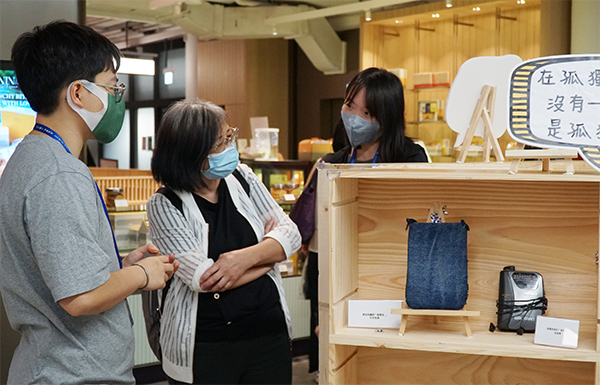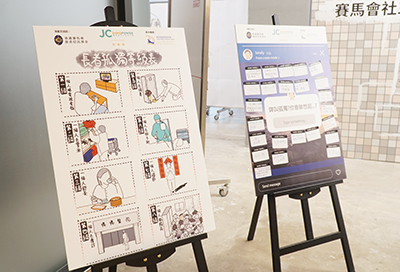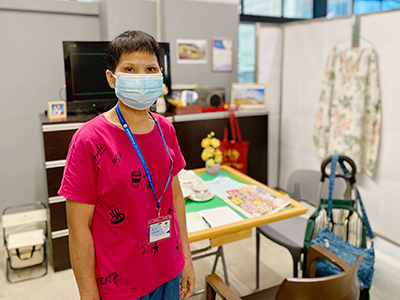CS Service:Persistence in Innovation to Help Elders Reconnect with The World

Yeung Wing Sze, Cin, the centre-in-charge of the Un Chau Neighbourhood Elderly Centre, joined HKCS in 2011. She has been an active participant in the development of elderly services. Approaching the topic of elderly services, she's always keen to share her recent ideas, 'The current trend for youngsters is video games. I have thought about an elderly version of Animal Crossing. If an elderly member has not been online one day, wouldn't we be able to notice that there’s something wrong?' Cin said excitedly, and continued introducing an idea about interactive television for the elderly, 'I grew up with my grandmother, elderly services are personal to me.' Cin has always been concerned about the needs of the elderly living alone. In September 2022, she held the ‘You are Not Alone in Age of Loneliness’ Exhibition at the Central Market.
Connecting Lonely Lives with The Exhibition
The exhibition is a part of the final phase of InnoPower Fellowship for Social Workers: Let's Meet Up, sponsored by The Hong Kong Jockey Club Charities Trust. One of the corners of the exhibition was a recreation of a household of an elderly living alone, with television, radio, medication, and medical appointment letters. Cin invited Waijan, an elderly living alone, to be a volunteer for the exhibition. When Waijan saw this 'household simulation,' she was surprised, 'oh, why does it look so much like my home?' She also always turns on the television and radio at home, 'just so there's some noise,' said Waijan. Cin quietly told us that Waijan was the origin of the exhibition.
 Cin (right) was introducing the exhibits to the public.
Cin (right) was introducing the exhibits to the public.
Waijan talks about loneliness all the time. Cin said, 'we interviewed dozens of elders to understand better what they mean when they say they are feeling lonely.' Waijan described loneliness, 'I am eligible to take public transport for just 2 dollars, but I don't know where I should go by myself.' Her biggest worry is that someday she will die at home, and nobody will notice. Her situation reflects the inner world of countless elders. Cin said that even though the elderly can seek help with the Safety Bell, it is only a piece of hardware. The exhibition centres on the relational aspect of elderly life. She continued, 'a lot of elders emphasise how they live by themselves all the time, but they are not alone in that feeling. How to connect all these lonely lives is the essence of this exhibition.'
Breaking New Grounds in Elderly Services
Cin feels that elderly services are always typecasted. Therefore, she strongly motivates herself and encourages her team to think outside the box, 'if elderly services are boxed in, the elderly can only live within the box.' She feels that we do not always have to start from zero when developing new projects but can integrate with services for other populations and sectors, which is a kind of creative thinking. Cin said, 'innovation is for fulfilling the needs of the elderly, to help them reconnect with the world. Otherwise, there is no point to innovation.' She pointed out that in recent years, there has been a trend in the west of promoting coexistence between different sectors of the community, combining elderly homes with kindergartens or day-care centres, letting the kids play in the elderly homes, 'the elders are happy to see the kids, and it lessens their feelings of loneliness.' As for her project with InnoPower Fellowship for Social Workers: Let’s Meet Up, she has invited 40 elders to enter a kindergarten and create an art piece collaboratively, promoting interaction between the younger generation and the old, which works similarly to the projects she has observed in other places.
Cin said, 'we need to showcase the strengths of the elderly so that other people can notice and appreciate them.' She remembered our collaborative project with A. S. Watsons in 2021, 'Joyful Brain Health,' inspired by the 'Restaurant of Mistaken Orders' in Japan. Elders with mild cognitive impairment were invited to be servers in Watsons' employee canteen, presenting a chance for dynamic cognitive impairment training, raising awareness of dementia for corporates, and promoting community support. She hoped this project could break corporations' stereotyping of elderly services. Other than providing services, we can enable the elderly to contribute.

The exhibition showcased the living environment of singleton elderly, allowing the public to imagine their life.
It also invited a singleton elderly to be volunteer to share their experiences.
'I Felt Lonely Too' When Her Grandmother Passed Away
Cin thinks that helping the elderly reconstruct and strengthen connections is integral to elderly care, 'to help them build connections with their past, others, and the community.' As previously mentioned, Waijan was also a carer, taking care of her disabled mother for over 20 years. After her mother's passing, Waijan's identity shifted from a carer to an elderly living alone. The feeling of loneliness consumed her being. She was not aware of the hobbies she might have. She longed to connect with others but also lacked self-esteem and worried about how others thought of her. In the end, she would rather stay at home.
When realising Waijan tended to become withdrawn, Cin encouraged her to participate in various activities, even being a volunteer in the exhibition, telling her own story to the masses. On the day of the event, Waijan said, 'I thought I was someone without a story to tell. Today, being a volunteer introducing the exhibition to the public, I feel a sense of achievement.' Cin said, 'Waijan now has a renewed sense of self-esteem and ability, having built connections with the community and being willing to contribute to the society.' One of the essential parts of elderly services is to mobilise the elderly to become a member of society, like Waijan.
'When I met Waijan, she shared with me her loneliness after her mother passed. I also shared the same feeling,' Cin sighed. In 2017, her grandmother fell sick at home. An unintentional fire started when she was boiling water. She died in the accident. Cin said, 'after my grandmother's passing, I went through a similar period of loneliness.'
Fortunately, Cin has learnt to deal with and live with her pain and transformed it into the motivation she needs to care for the elderly. This motivation propelled her to continue to innovate and help more lives entrenched with loneliness.

A loneliness scale for the elderly was designed at the exhibition to help the public understand the sense of loneliness experienced by the elderly.








